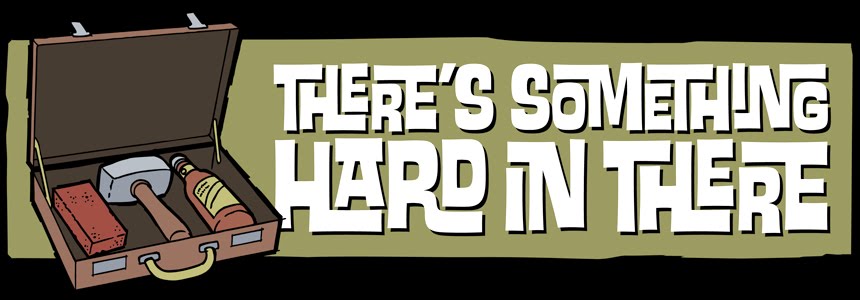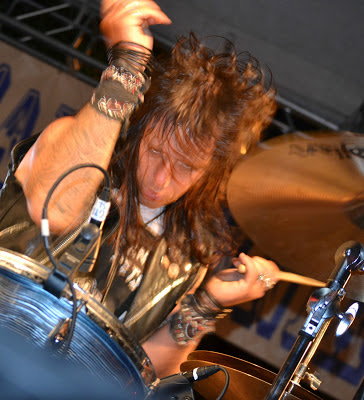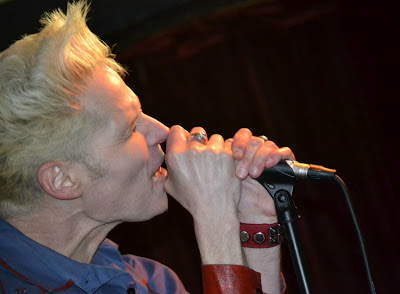 |
| Keith Morris (Andy photo) |
Andy talked to a bunch of people in a bunch of bands in 2012.
Here's some memorable quotes:
Keith Morris on OFF!:
We're nothing more than a folk band. When you boil all of the flesh and the meat, the muscle and the skin off of the bones. When you're listening to OFF!, we're nothing more than a protest band, we're just a folk band -- but we're loud, we're obnoxious, we're in your face and we're angry about it.
Ian MacKaye (The Evens):
I feel like right now while we're talking, there's some kids, if they're not already playing it, they're cookin' it up-- it's comin', can't be stopped. And if it can be stopped, then we wouldn't be talking, because I wouldn't have been able to do it back then. It's never over.
Reed Mullin (Corrosion of Conformity):
I think this is COC and it will be together until we start to crumble-- I can't imagine us stopping now, I think we're just getting geared up... and do another 30 years, COC 90-something (laughs).
Dan Kubinski (die kreuzen) via email:
For me in those early days, playing live was almost better than recording. Those early tours were a whirlwind of lights, sweat and volume that were always intense. Our songs were for real, we worked so hard on them both musically and lyrically so that when we played live, there were pieces of us that were flying out of our instruments and vocal chords and through the PA systems. We weren’t trying to be something, we were just being ourselves. We were for real....
Henry Rollins on Black Flag's intense work ethic (via email):
In my opinion, that’s the way you get your music together and make the live shows good. You really have to work. This is what Black Flag was all about. It was the Ginn/Dukowski method and it worked very well. It’s hard on the band but that is what it takes to kill it live. Being in a band, a real band with real ambition is a very hard thing to do. Most bands are not successful. They are usually not all that good and if they are, they rarely have the intensity to take it to the degree needed to get it over the wall. It will break you to pieces, so you have to deal with that.
Tom Price (Tom Price Desert Classic):
Don't wear a baseball hat on stage, because a baseball hat is the symbol of egalitarianism, it makes everybody equal. The purpose of a stage is to make you not equal, it's to make you temporarily special and above. So, if you wear a baseball hat on stage, you negate both the baseball hat and the stage. Nothing against baseball hats.
Mike Magrann (Channel 3):
It never fails, and we've talked to every punk-rock dad out there, and the kids are just like, 'Dad, you're so lame.' (Laughter) And I'm like, 'Don't you understand? I'm a 'punk-rock god.' And they're like, 'Dad, come on, your hair is grey.' So, you can never win over a teenage girl.
Mark Adams (Saint Vitus):
Everything's just fucking pretty crazy. It's almost like a time machine going backwards, but instead of nobody caring, people care now -- it's pretty far out.
Mike IX Williams on EYEHATEGOD's history:
It was bizarre to all of us. To me, that was more of a way to move this band even further-- 'the original singer is a born-again Christian?' Nowadays, Jimmy (Bower's) given him CDs of the band and he'll tell Jimmy later, 'I threw it in the garbage' -- I guess he thinks we're all going to hell because we kept using the name.
Mike Watt (fIREHOSE, Missingmen):
Even when I doubt myself, when that fever got me tonight, the momentum of those days -- and it's not a 'Happy Days,' Fonzie and Potsie and that shit -- it's the kind of ethics that were built with that shit, still apply now, and that's why I do call it a movement... there's a lot of autonomy, not much hierarchy. There would have been no 'Double Nickels' if Husker didn't do 'Zen Arcade' -- shit like that.
KJ Jansen (Chixdiggit):
We still get to do this. We're in Seattle right now playing rock and roll-- still, you know? This shit should have ended years ago. I get to travel around with my best friend, get drunk and be a jackass and do interviews... it's like, fucked up.
 |
| Scott Hill (Cat Rose photo) |
Scott Hill (Fu Manchu) on hearing Black Flag for the first time:
I was like, 'What the fuck's THIS?' And he (a friend) was, 'BLACK FLAG!' I was in junior high, and we had punk day: 'Punk is Bunk,' people wrote on their shirts. I was listening to Deep Purple, Blue Cheer, Nugent and stuff, and I heard Flag, and I was like, 'Holy Shit'... took the tape and didn't even give it back to him. I got turned on to the Adolescents, you know, went from there, Circle Jerks, and it was like, 'Oh Shit,' just bought everything I could, every zine, kept my fliers, wrote bands, just every dime I had went into buying records.
Our friend Melissa on Skelator's leather-armbanded singer:
I feel like he's gonna dive off the stage and land on a unicorn ... or turn into a unicorn.
Ben London on reviving Alcohol Funnycar's songs:
(It's a) really weird sensation, going back and learning songs you wrote that you don't remember the lyrics or the chords to. I write a lot of songs -- or try to -- and so they kind of get pushed to the back of bus. It's kind of like looking at pictures of yourself from high school or from college or something like that, where you're sort of like, 'What was I thinking? Was that haircut really a good move at that time?'
Joel Ross (Lopez):
The accessibility of punk-rock bands-- that really started to get me into it a lot. Seeing them live and just how much it was a one-on-one thing. It wasn't so much of like, OK, here's this huge stage with a light show and the whole nine freaking yards, and then the 30-foot barricade and then the crowd.
Aaron Beam (Red Fang):
We're four older gentlemen who are too stupid to stop playing rock music and touring.
Ron Reyes (former Black Flag singer) on playing guitar in Piggy:
For me, it's great because, for some reason, there's a lot less anxiety attached to it. As a singer, as a frontman, I have great anxieties about that -- always have -- and it's one of the reasons why I haven't done it for a very, very long time. It's not that I'm awful at it, but it's just that I feel like I'm gonna shit my pants, every moment I'm up there (laughs).
Pat Hoed (Fantasma) on unveiling Brujeria members' identities (they cover their faces with bandanas on stage):
We tried to keep it secret. Once the Internet age hit, it was like forget it, everybody fucking knows.
Ed Crawford (fIREHOSE):
It's somewhat surreal, yes. And sublime -- oh, look at me, my fancy words. It's like we were off for a month and came back, and not 18 years. It's really bizarre... and really beautiful at the same time.
I mean, who gets to play with Mike Watt and George Hurley? I do. I'm over the moon, head over heels, just having the best time of my life.
Penelope Houston on the Avengers' gig with the Sex Pistols in 1978 in San Francisco:
It was kind of weird because, we'd been playing for six months in the Bay Area and also LA, and on the whole West Coast, we could think of about 500 punks, those were the people we knew, we saw in our audience. So, to get on stage and look out at 5,000 or 6,000 people, who weren't necessarily punk, but they were all throwing shit and spitting, behaving badly, was just like, 'What, who the fuck are you?' It's like, 'What is going on?'
James Farris (Moral Crux) on ideas for lyrics:
You know the whole thing with technology, too, how that's affecting us socially, being somewhat muted as people just, whether it be like resolving conflicts or whatever, being able to kind of come up and talk to people, the whole texting thing. I suppose it has its purpose, but it just seems when it starts to kind of run you. And then, the whole Facebook thing, I just tell people, 'Why don't you just go talk to your real friends?' It's got a use, like if you're in a band or if you have relatives way far away...
Peter Case on touring with Paul Collins and playing old Nerves, Plimsouls and Beat tunes:
The other thing about it is the song catalogue that we made up. All these songs from back before 1983, it's really fun to kind of revive them and bring them back around because we made them at the time to be sort of timeless-- we never went with gimmicks or the time.
Glen E. Friedman (photographer):
But when I was taking pictures, yeah I'd be right in the front, because I knew everyone there, and sometimes I'd sit on the stage and sometimes I'd stand right in the front row, and certainly I got whacked a lot of times, but anyone who's been to a show knows what you're doing, you know how to stay the fuck out of the way and accidents happen -- so you get hit, no big deal.
Blair Shehan (Jealous Sound) on playing live:
You just roll with it, have fun -- I fuck up, somebody else fucks up, it doesn't matter, I'll go and give you a hug. It's like, 'Cool, we'll do better next time.' It's not that important, it's more about how the whole thing feels. That's what I walk away with and I hope the audience walks away with. Overall, we had a good time, you had a great time, it's an awesome ping-ponging back of energy.
Kasey Keller (former USA World Cup goalkeeper and our own Seattle Sounders alum):
When you're a 15-year-old, middle-class farmboy from Olympia, Washington, the next punk that came about in the mid-'80s was gangster rap. So when gangster rap first came out, you couldn't get any more punk than being a white kid from Olympia, Washington, listening to gangster rap.
 |
| Kasey Keller (Andy photo) |































